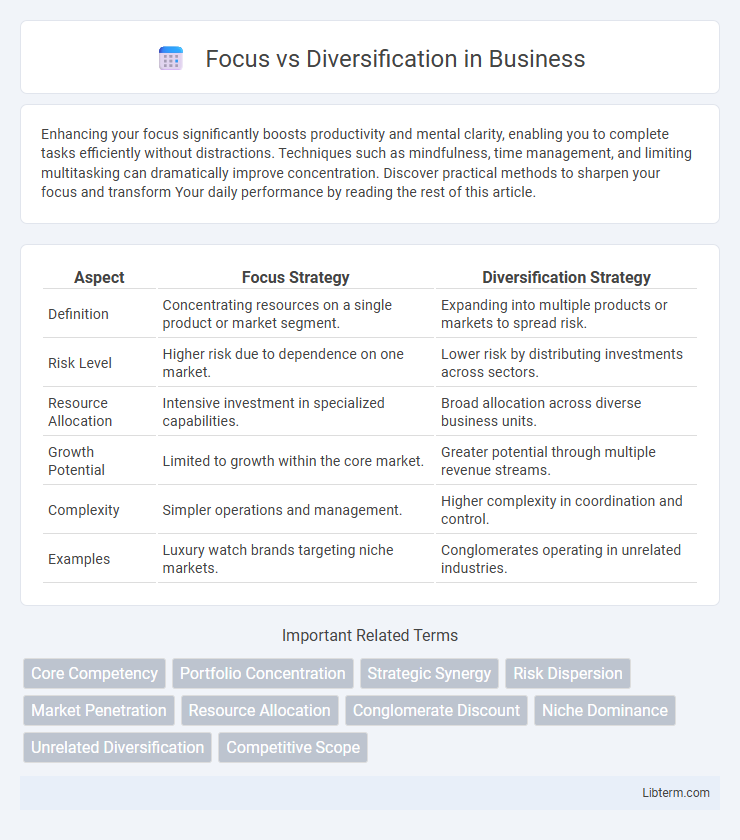Enhancing your focus significantly boosts productivity and mental clarity, enabling you to complete tasks efficiently without distractions. Techniques such as mindfulness, time management, and limiting multitasking can dramatically improve concentration. Discover practical methods to sharpen your focus and transform Your daily performance by reading the rest of this article.
Table of Comparison
| Aspect | Focus Strategy | Diversification Strategy |
|---|---|---|
| Definition | Concentrating resources on a single product or market segment. | Expanding into multiple products or markets to spread risk. |
| Risk Level | Higher risk due to dependence on one market. | Lower risk by distributing investments across sectors. |
| Resource Allocation | Intensive investment in specialized capabilities. | Broad allocation across diverse business units. |
| Growth Potential | Limited to growth within the core market. | Greater potential through multiple revenue streams. |
| Complexity | Simpler operations and management. | Higher complexity in coordination and control. |
| Examples | Luxury watch brands targeting niche markets. | Conglomerates operating in unrelated industries. |
Understanding Focus and Diversification
Focus involves concentrating resources and efforts on a single market, product, or skill set to build deep expertise and competitive advantage, which drives efficiency and stronger brand identity. Diversification spreads investments across multiple markets or products to reduce risk and tap into new growth opportunities, enhancing resilience against market fluctuations. Businesses must weigh the depth of specialized knowledge in focus against the breadth and risk mitigation benefits of diversification to align with strategic goals.
The Core Principles of Focus
Focus in business strategy emphasizes concentrating resources and efforts on core competencies to achieve competitive advantage and operational efficiency. Companies adopting a focused approach prioritize a narrow market segment or product line, enhancing expertise and customer loyalty within that niche. This strategy drives superior innovation and profitability by avoiding dilution of brand value and minimizing unnecessary diversification risks.
Key Benefits of Focusing Your Efforts
Concentrating efforts on a specific niche enhances expertise and drives innovation, leading to increased competitive advantage and market leadership. Focus allows for better resource allocation, resulting in higher efficiency and improved product or service quality. Businesses that prioritize focus experience stronger brand recognition and customer loyalty through tailored offerings and consistent value delivery.
Diversification: Expanding Horizons
Diversification enhances portfolio resilience by spreading investments across various asset classes, sectors, and geographic regions, reducing overall risk exposure. Expanding horizons through diversification allows investors to capitalize on emerging markets and innovative industries, fostering long-term growth and stability. This strategic approach balances potential returns while minimizing the impact of market volatility on a concentrated portfolio.
Advantages of Diversification Strategies
Diversification strategies enhance business resilience by spreading risk across multiple products, markets, or industries, reducing dependency on a single revenue source. Companies practicing diversification often experience increased growth opportunities and access to new customer segments, boosting long-term profitability. This approach also fosters innovation by encouraging exploration of varied market trends and technologies.
Comparing Focus vs Diversification
Focus strategy concentrates resources on a narrow market segment or product line, enhancing expertise and competitive advantage in a specific area. Diversification spreads investments across multiple markets or product categories, reducing risk by minimizing dependence on a single source of revenue. Companies pursuing focus often achieve higher efficiency and brand loyalty, while diversified firms benefit from risk mitigation and potential growth in varied sectors.
Risks Associated with Over-Focus
Excessive focus on a single market or product increases vulnerability to economic downturns, regulatory changes, and shifts in consumer preferences, potentially resulting in significant financial losses. Companies concentrated in one area face heightened operational risks, including supply chain disruptions and technological obsolescence. Diversification mitigates these risks by spreading exposure across different industries, regions, and asset classes, enhancing overall portfolio stability and long-term growth potential.
Potential Pitfalls of Diversification
Diversification can dilute a company's core competencies, leading to inefficiencies and weakened brand identity. Expanding into unrelated markets increases operational complexity and can strain management resources. Studies show that excessive diversification is often linked to lower shareholder returns due to loss of strategic focus.
When to Choose Focus or Diversification
Choosing focus is ideal for businesses with limited resources aiming to dominate a niche market, leveraging specialized expertise and tailored marketing strategies to build strong customer loyalty. Diversification suits firms seeking risk mitigation by expanding product lines or entering new markets, thereby reducing dependence on a single revenue stream and enhancing growth opportunities. Strategic decision-making depends on market conditions, competitive intensity, and organizational capabilities, where focus drives depth and diversification promotes breadth.
Crafting a Balanced Growth Strategy
Crafting a balanced growth strategy involves carefully weighing the benefits of focus versus diversification to optimize business performance. Concentrating resources on core competencies enhances efficiency and market strength, while diversification mitigates risks by expanding into new markets or products. Strategic alignment of both approaches ensures sustainable growth by leveraging specialization and exploring opportunities for innovation.
Focus Infographic

 libterm.com
libterm.com